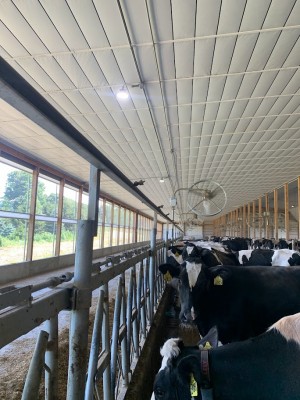Six Steps to Lower Your Fan Energy Bill - Dairy Herd Management

Six Steps to Lower Your Fan Energy Bill (For original article, click here)
By TAYLOR LEACH June 25, 2022 - Dairy Herd Management
Throughout the country, fans are running at maximum speed to help keep cows cool and comfortable. However, the non-stop heat of summer also has electric bills soaring.
According to Donna Amaral-Philips, Dairy Extension Educator at the University of Kentucky, ventilation systems can account for a large portion of a farms energy bill. In fact, some ventilation systems - particularly mechanical systems - can account for 20%-25% of a farms total energy usage.
As energy prices climb, some farmers are feeling the sting of high electric bills.
"Even with increased costs for electricity, the use of circulation fans for increased air speed are a necessary expense to reduce heat stress and to prevent the associated decreases in milk production, reproductive performance, and performance of future generations," Amaral-Philips says.
Poor or inadequate fan maintenance can decrease the overall airflow by fans as well as the efficiency of these motors by as much as 40%, thus, increasing electric bills unnecessarily. As little as 1/8 inch of dust on the fan blades can decrease the efficiency of the motor of the fan, Amaral-Philips notes.
"Maintenance on fans should be completed not once, but 3 to 4 times per year, to improve/maintain the efficiency of the fan motors and air speeds within the facility," she says.
To help improve fan efficiency and lower energy costs, Amaral-Philips recommends the following steps.
- Clean dust from the blades, motor windings, sensors and thermostats.
- Lubricate the fan according to the manufacturer's recommendations.
- Check the belts for wear and stretch. Belts should ride on top of the pulley. Replace belts as needed.
- Check the electrical cords and wiring for breaks or disintegration of the wiring covering.
- Check that the thermostat is operating properly- i.e. comes on at the proper temperature (65ºF)
- Check the angle of each fan such that the air movement of the fan "blows' to the ground level below the next fan.
Upcoming Events
Crops, Cows & Critters - Southwest New York Dairy, Livestock & Field Crops Newsletter Sponsorship
December 19, 2025
Our two forms of publications feature research-based and timely information from our four specialists, listed to the right, along with local event notifications and Cornell University outreach. This information is provided to participants who range from dairy, livestock, and field crops producers to agricultural suppliers and consultants.
Weekly Email Update: Shared with 625+ households who have signed up with our program.
Monthly Paper Mailer: To reach our stakeholders and farmers who lack internet access, we send out a monthly mailer where your company's logo and contact information would be featured with a mailing list of 330+ households.
If you sponsor our weekly and monthly publications you reach approximately 955 households.
Visit our website to view our newsletters!
2025 Cornell Food Beverage & Animal Feed Manufacturer Survey
December 19, 2025
Industry and Educational Advocates for New York State's Food, Beverage, and Animal Feed Manufacturing industries:
As you know, NYS has a diverse food and beverage manufacturing industry, in both the types of industries that exist and the wide distribution of firms by scale. Many manufacturing firms have strong backward linkages to agricultural production sectors in the state that support both farm-level and downstream food industry firms and consumers. In collaboration with the New York State Department of Agriculture and Markets, a team from Cornell University's Charles H. Dyson School of Applied Economics and Management has recently rolled out the 2025 New York State Food, Beverage, and Animal Feed Manufacturer Survey. The industry will benefit from an updated assessment of the industry that informs private and public investments and opportunities to support firm growth and improved profitability.
Cornell Organic Field Crops & Dairy Conference
March 6, 2026
Waterloo, NY
Farmers, researchers, educators, and agricultural service providers from across the Northeast are invited to the 2026 Cornell Organic Field Crops & Dairy Conference, held Friday, March 6, 2026, from 8:00 a.m. to 4:30 p.m. at the Lux Hotel & Conference Center in Waterloo, N.Y.
Co-hosted by New York Soil Health and Cornell CALS, the annual conference brings together leaders in organic grain, dairy, and livestock systems to share practical tools, new research, and farmer-tested strategies to support resilient and profitable organic production.
Announcements
No announcements at this time.





